首页 > 代码库 > 数据仓库的未来 MariaDB ColumnStore
数据仓库的未来 MariaDB ColumnStore

MariaDB ColumnStore
简介
Part1:写在最前
MariaDB ColumnStore is the future of data warehousing. ColumnStore allows us to store more data and analyze it faster. Everyday, Pinger’s mobile applications process millions of text messages and phone calls. We also process more than 1.5 billion rows of logs per day. Analytic scalability and performance is critical to our business. MariaDB’s ColumnStore manages massive amounts of data and will scale with Pinger as we grow.
----from mariadb.com
Part2:大牛如何说
MariaDB ColumnStore是在MariaDB 10.1基础上移植了InfiniDB4.6.2构建的大规模并行,高性能,压缩,分布式开源列式存储引擎,类似收费产品Infobright。它设计用于大数据离线分析,用来抗衡Hadoop。你可以使用标准SQL语句进行查询,支持目前流行的sqlyog/navicat客户端工具连接,对业务方使用没有任何的不便,并且你不需要创建任何索引,不需要修改业务方的复杂SQL(自身就支持复杂的关联查询、聚合、存储过程和用户定义的函数),你唯一要做的就是把数据导入到ColumnStore里,就没你事了。这对一家没有Hadoop工程师的公司来说,MariaDB ColumnStore会是一个更好的替代产品。
-----from 贺春旸
Part3:环境简介
192.168.1.248 HE1 um1
192.168.1.249 HE2 um2
192.168.1.250 HE3 pm1
192.168.1.251 HE4 pm2
Column Store架构概述
Part1:写在最前
MariaDB ColumnStore是一种专为分布式大规模并行处理(MPP)设计的列式存储引擎。它由三个组件组成,协同工作。
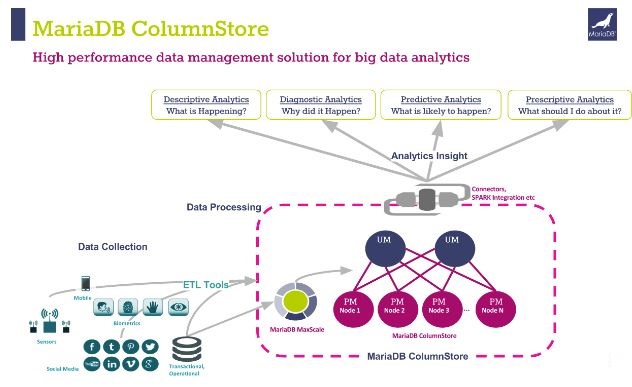
在官方给出的架构图中,我们可以看到分为三个组件构成:UM、PM、数据存储层。
用户模块(UM):
用户模块管理和控制终端用户查询的操作,它维护每个查询的状态,向一个或多个性能模块发出请求以代为执行SQL查询工作,最后,用户模块汇集来自各个参与的性能模块的所有查询结果,以形成返回给用户的完整的查询结果集。
性能模块(PM):
性能模块负责存储,检索和管理数据,处理对查询操作的块请求,并将其传递回用户模块以完成查询请求。性能模块将获取的数据缓存在其内存中计算。MPP是通过允许用户配置尽可能多的性能模块,以实现更高的处理能力。
存储:
MariaDB ColumnStore对于存储系统极为灵活。当在内部运行时,它可以使用本地存储或共享存储(例如SAN)来存储数据。在Amazon EC2环境中,它可以使用临时或弹性块存储(EBS)卷。当无共享部署需要数据冗余时,它被构建为与GlusterFS和Apache Hadoop分布式文件系统(HDFS)集成。
一句话总结:用户模块(UM)将客户端发出的SQL请求进行分配,分配到后端性能模块(PM),PM进行数据查询分析,将处理的结果返回给UM,UM再把PM分析的结果进行聚合,最后返回给客户端最终的查询结果。
Column Store性能对比
Percona专业MySQL服务提供商性能测试InfiniDB比其他OLAP优势明显。
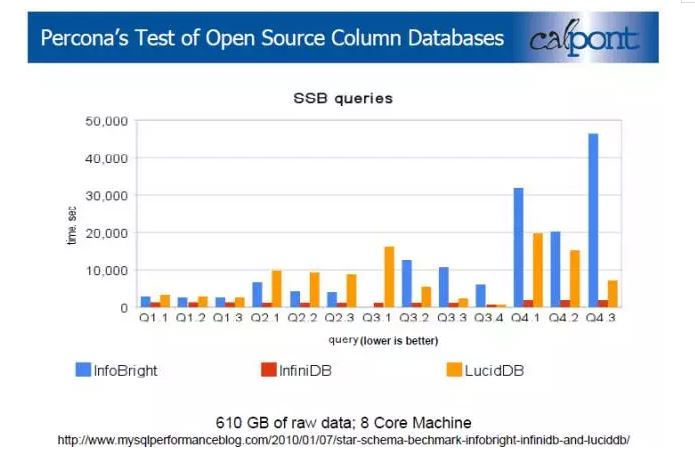
Column Store安装
Part1:打通互信
[root@HE1 ~]# ssh-keygen [root@HE1 ~]# ssh-copy-id ‘-p 22 root@192.168.1.248‘ [root@HE1 ~]# ssh-copy-id ‘-p 22 root@192.168.1.249‘ [root@HE1 ~]# ssh-copy-id ‘-p 22 root@192.168.1.250‘ [root@HE1 ~]# ssh-copy-id ‘-p 22 root@192.168.1.251‘ [root@HE1 ~]# ssh HE1 [root@HE1 ~]# ssh HE2 [root@HE1 ~]# ssh HE3 [root@HE1 ~]# ssh HE4 [root@HE1 ~]# cat /etc/hosts 192.168.1.248 HE1 192.168.1.249 HE2 192.168.1.250 HE3 192.168.1.251 HE4
在HE1,HE2,HE3,HE4每台机器上执行上述命令,打通ssh互信。
Part2:关闭防火墙
[root@HE1 ~]# /etc/init.d/iptables status
iptables: Firewall is not running.
[root@HE1 ~]# chkconfig iptables off
[root@HE1 ~]# chkconfig --list | grep iptables
iptables 0:off1:off2:off3:off4:off5:off6:off
Part3:关闭文件系统访问时间和修改磁盘调度策略
[root@HE1 ~]# cat /etc/fstab # # /etc/fstab # Created by anaconda on Sat Mar 5 09:35:40 2016 # # Accessible filesystems, by reference, are maintained under ‘/dev/disk‘ # See man pages fstab(5), findfs(8), mount(8) and/or blkid(8) for more info # UUID=397d50ba-22b0-4d50-9e29-89e3b92d2d07 / ext4 defaults,noatime,barrier=0 1 1 [root@HE1 ~]# echo "deadline" > /sys/block/sda/queue/scheduler
Part4:关闭numa
[root@HE1 ~]# cat /etc/grub.conf # grub.conf generated by anaconda # # Note that you do not have to rerun grub after making changes to this file # NOTICE: You have a /boot partition. This means that # all kernel and initrd paths are relative to /boot/, eg. # root (hd0,0) # kernel /vmlinuz-version ro root=/dev/sda2 # initrd /initrd-[generic-]version.img #boot=/dev/sda default=1 timeout=5 splashimage=(hd0,0)/grub/splash.xpm.gz hiddenmenu title CentOS (2.6.32-573.18.1.el6.x86_64.debug) root (hd0,0) kernel /vmlinuz-2.6.32-573.18.1.el6.x86_64.debug ro root=UUID=397d50ba-22b0-4d50-9e29-89e3b92d2d07 rd_NO_LUKS rd_NO_LVM LANG=en_US.UTF-8 rd_NO_MD SYSFONT=latarcyrheb-sun16 crashkernel=auto KEYBOARDTYPE=pc KEYTABLE=us rd_NO_DM rhgb quiet numa=off initrd /initramfs-2.6.32-573.18.1.el6.x86_64.debug.img title CentOS (2.6.32-431.el6.x86_64) root (hd0,0) kernel /vmlinuz-2.6.32-431.el6.x86_64 ro root=UUID=397d50ba-22b0-4d50-9e29-89e3b92d2d07 rd_NO_LUKS rd_NO_LVM LANG=en_US.UTF-8 rd_NO_MD SYSFONT=latarcyrheb-sun16 crashkernel=auto KEYBOARDTYPE=pc KEYTABLE=us rd_NO_DM rhgb quiet numa=off initrd /initramfs-2.6.32-431.el6.x86_64.img
Part5:安装jemalloc内存管理
[root@HE1 ~]# yum install jemalloc-*
[root@HE1 ~]# reboot
在HE1,HE2,HE3,HE4每台机器上执行上述命令
Part6:安装boost软件包
[root@HE1 ~]# yum -y install boost*
[root@HE1 ~]# yum -y groupinstall "Development Tools"
[root@HE1 ~]# yum -y install cmake
[root@HE1 ~]# tar xvf boost_1_55_0.tar.gz
[root@HE1 ~]# cd boost_1_55_0
[root@HE1 boost_1_55_0]# ./bootstrap.sh --with-libraries=atomic,date_time,exception,filesystem,iostreams,locale,program_options,regex,signals,system,test,thread,timer,log --prefix=/usr
[root@HE1 boost_1_55_0]# ./b2 install
Part6:安装perl依赖包
[root@HE1 ~]# yum -y install expect perl perl-DBI openssl zlib perl-DBD-MySQL
Part7:安装Mariadb ColumStore
[root@HE1 ~]# tar xvf mariadb-columnstore-1.0.6-1-centos6.x86_64.bin.tar.gz -C /usr/local
Part8:配置Mariadb ColumStore
[root@HE1 ~]# /usr/local/mariadb/columnstore/bin/postConfigure




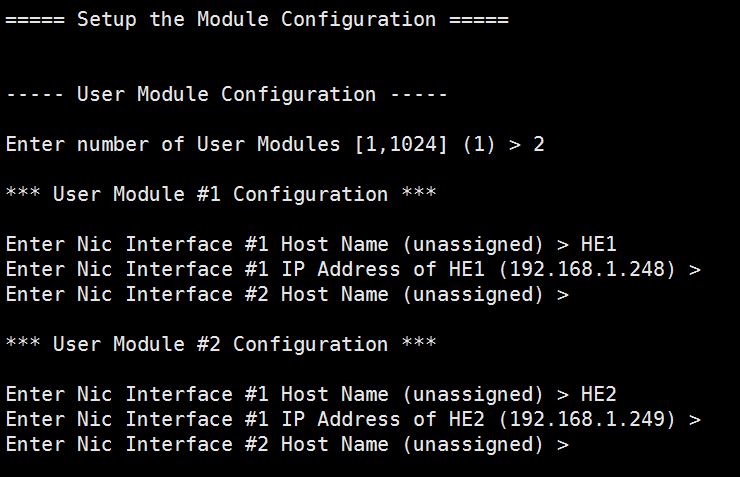


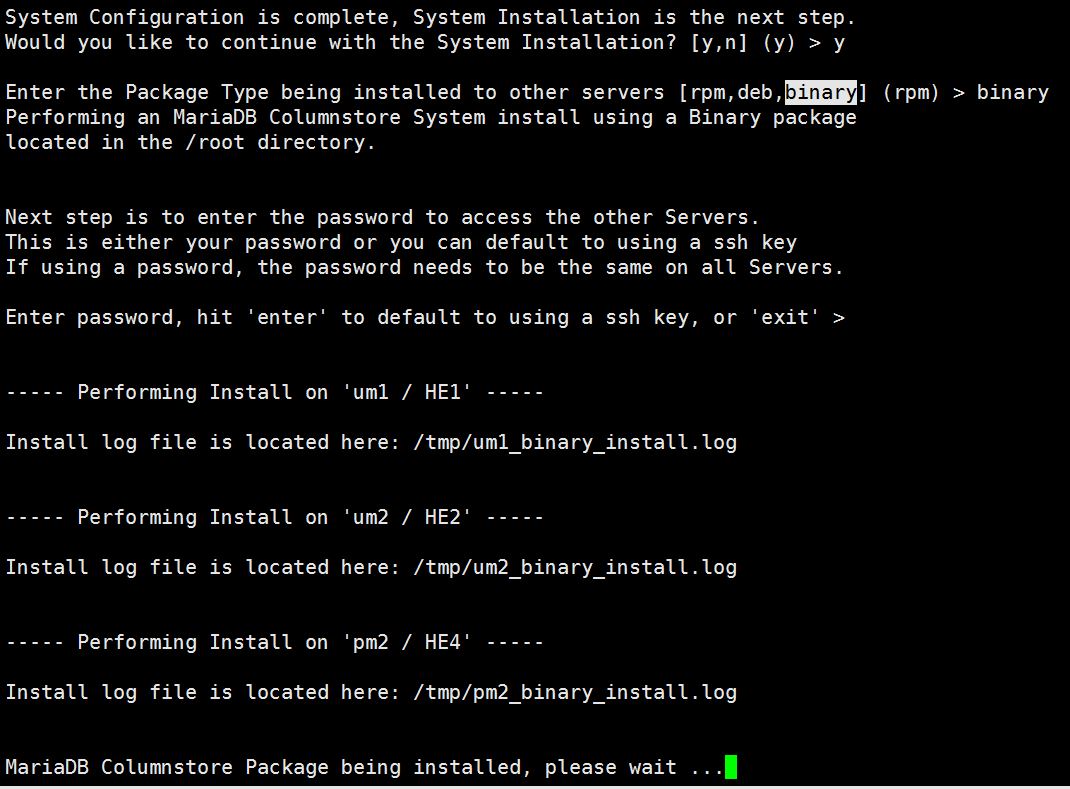
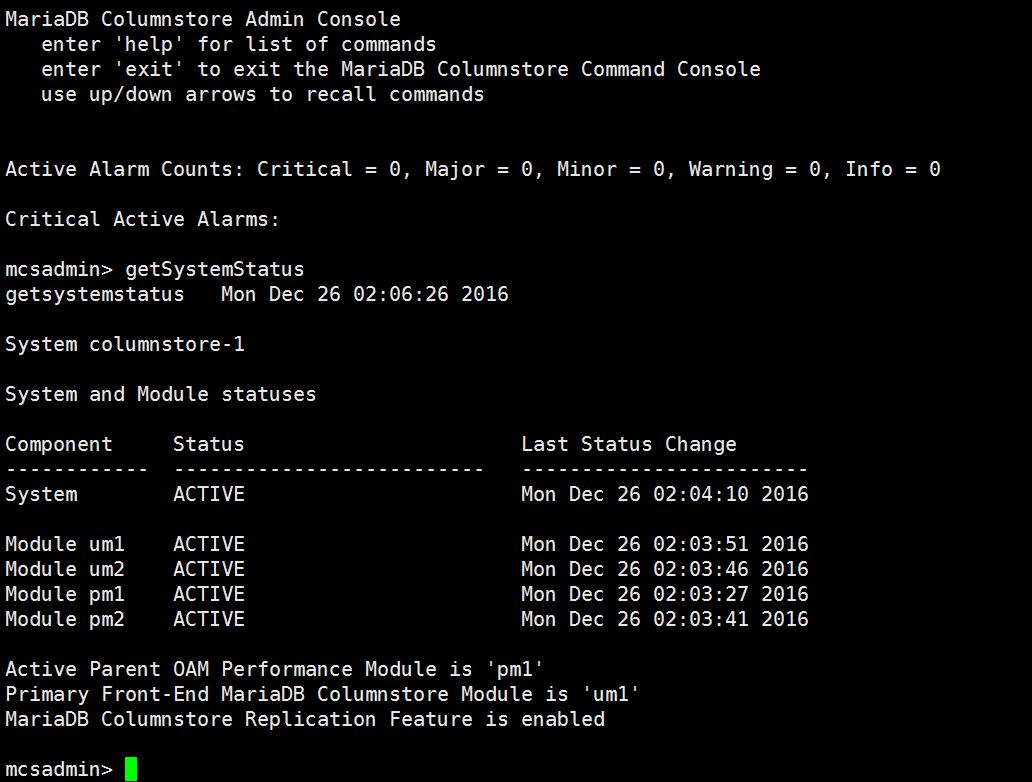
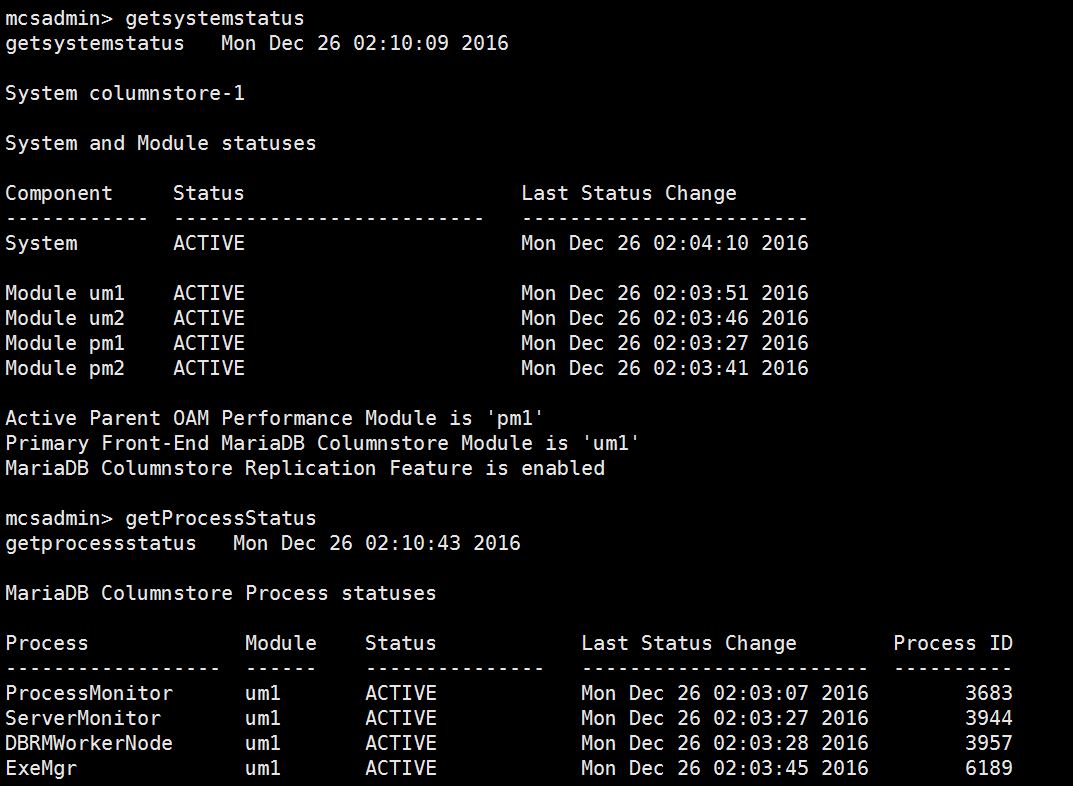
至此,MariaDB ColumnStore安装并配置完成
Column Store单点故障测试
Part1:关闭HE2
当前HE2为primary um
mcsadmin> getSystemStatus getsystemstatus Mon Dec 26 15:56:47 2016 System columnstore-1 System and Module statuses Component Status Last Status Change ------------ -------------------------- ------------------------ System BUSY_INIT Mon Dec 26 15:56:38 2016 Module um1 AUTO_DISABLED/DEGRADED Mon Dec 26 15:56:40 2016 Module um2 ACTIVE Mon Dec 26 15:54:21 2016 Module pm1 ACTIVE Mon Dec 26 02:03:27 2016 Module pm2 ACTIVE Mon Dec 26 02:03:41 2016 Active Parent OAM Performance Module is ‘pm1‘ Primary Front-End MariaDB Columnstore Module is ‘um2‘ MariaDB Columnstore Replication Feature is enabled [root@HE2 ~]# reboot
在当前primary um重启后,可以看到primary um已经自动切换至um1
mcsadmin> getSystemStatus getsystemstatus Mon Dec 26 15:58:19 2016 System columnstore-1 System and Module statuses Component Status Last Status Change ------------ -------------------------- ------------------------ System BUSY_INIT Mon Dec 26 15:58:10 2016 Module um1 ACTIVE Mon Dec 26 15:57:17 2016 Module um2 AUTO_DISABLED/DEGRADED Mon Dec 26 15:58:11 2016 Module pm1 ACTIVE Mon Dec 26 02:03:27 2016 Module pm2 ACTIVE Mon Dec 26 02:03:41 2016 Active Parent OAM Performance Module is ‘pm1‘ Primary Front-End MariaDB Columnstore Module is ‘um1‘ MariaDB Columnstore Replication Feature is enabled
Part2:检查状态
在原primary um (HE2)中进入数据库查看,现在已经是um1的从库
[root@HE2 ~]# mcsmysql Welcome to the MariaDB monitor. Commands end with ; or \g. Your MariaDB connection id is 10 Server version: 10.1.19-MariaDB Columnstore 1.0.6-1 Copyright (c) 2000, 2016, Oracle, MariaDB Corporation Ab and others. Type ‘help;‘ or ‘\h‘ for help. Type ‘\c‘ to clear the current input statement. MariaDB [(none)]> show slave status\G *************************** 1. row *************************** Slave_IO_State: Waiting for master to send event Master_Host: 192.168.1.248 Master_User: idbrep Master_Port: 3306 Connect_Retry: 60 Master_Log_File: mysql-bin.000013 Read_Master_Log_Pos: 1879 Relay_Log_File: relay-bin.000002 Relay_Log_Pos: 537 Relay_Master_Log_File: mysql-bin.000013 Slave_IO_Running: Yes Slave_SQL_Running: Yes Replicate_Do_DB: Replicate_Ignore_DB: Replicate_Do_Table: Replicate_Ignore_Table: Replicate_Wild_Do_Table: Replicate_Wild_Ignore_Table: Last_Errno: 0 Last_Error: Skip_Counter: 0 Exec_Master_Log_Pos: 1879 Relay_Log_Space: 829 Until_Condition: None Until_Log_File: Until_Log_Pos: 0 Master_SSL_Allowed: No Master_SSL_CA_File: Master_SSL_CA_Path: Master_SSL_Cert: Master_SSL_Cipher: Master_SSL_Key: Seconds_Behind_Master: 0 Master_SSL_Verify_Server_Cert: No Last_IO_Errno: 0 Last_IO_Error: Last_SQL_Errno: 0 Last_SQL_Error: Replicate_Ignore_Server_Ids: Master_Server_Id: 1 Master_SSL_Crl: Master_SSL_Crlpath: Using_Gtid: No Gtid_IO_Pos: Replicate_Do_Domain_Ids: Replicate_Ignore_Domain_Ids: Parallel_Mode: conservative 1 row in set (0.00 sec) MariaDB [(none)]>
Column Store测试
Part1:主键和索引
MariaDB [helei]> create table helei_innodb( -> id int(10) unsigned NOT NULL AUTO_INCREMENT, -> c1 int(10) NOT NULL DEFAULT ‘0‘, -> c2 int(10) unsigned DEFAULT NULL, -> c5 int(10) unsigned NOT NULL DEFAULT ‘0‘, -> c3 timestamp NOT NULL DEFAULT CURRENT_TIMESTAMP ON UPDATE CURRENT_TIMESTAMP, -> c4 varchar(200) NOT NULL DEFAULT ‘‘, -> PRIMARY KEY(id), -> KEY idx_c1(c1), -> KEY idx_c2(c2) -> )ENGINE=InnoDB ; Query OK, 0 rows affected (0.03 sec) MariaDB [helei]> create table helei_cs( -> id int(10) unsigned NOT NULL AUTO_INCREMENT, -> c1 int(10) NOT NULL DEFAULT ‘0‘, -> c2 int(10) unsigned DEFAULT NULL, -> c5 int(10) unsigned NOT NULL DEFAULT ‘0‘, -> c3 timestamp NOT NULL DEFAULT CURRENT_TIMESTAMP ON UPDATE CURRENT_TIMESTAMP, -> c4 varchar(200) NOT NULL DEFAULT ‘‘, -> PRIMARY KEY(id), -> KEY idx_c1(c1), -> KEY idx_c2(c2) -> )ENGINE=Columnstore; ERROR 1069 (42000): Too many keys specified; max 0 keys allowed
这里可以看出,columnstore存储引擎不支持主键也不需要索引
MariaDB [helei]> create table helei_cs( -> id int(10) unsigned NOT NULL , -> c1 varchar(200) NOT NULL DEFAULT ‘‘ -> )ENGINE=Columnstore; Query OK, 0 rows affected (0.34 sec) MariaDB [helei]> insert into helei_cs values(1,‘1‘); Query OK, 1 row affected (0.60 sec) MariaDB [helei]> insert into helei_cs values(2,‘2‘); Query OK, 1 row affected (0.08 sec) MariaDB [helei]> insert into helei_cs values(3,‘3‘); Query OK, 1 row affected (0.17 sec)
这里可以看出columnstore的插入速度较慢
Warning:警告
columnstore不支持主键、索引、timestamp、collate用法、char\varchar类型的sum/average用法。
Part2:效率测试
1G内存虚拟机MariaDB ColumnStore 2.82s,线上生产库8G的innodb_buffer_pool_size该条慢查询耗时17.894s。


——总结——
大家可以用生产的复杂SQL跑一跑,来体验一下。由于笔者的水平有限,编写时间也很仓促,文中难免会出现一些错误或者不准确的地方,不妥之处恳请读者批评指正。
本文出自 “贺磊的技术博客” 博客,请务必保留此出处http://suifu.blog.51cto.com/9167728/1886417
数据仓库的未来 MariaDB ColumnStore
